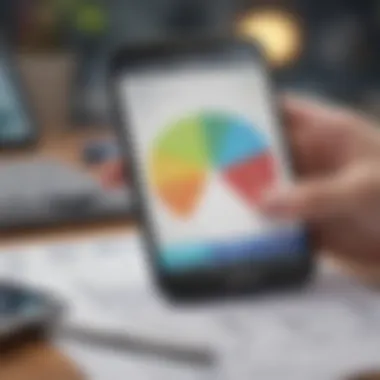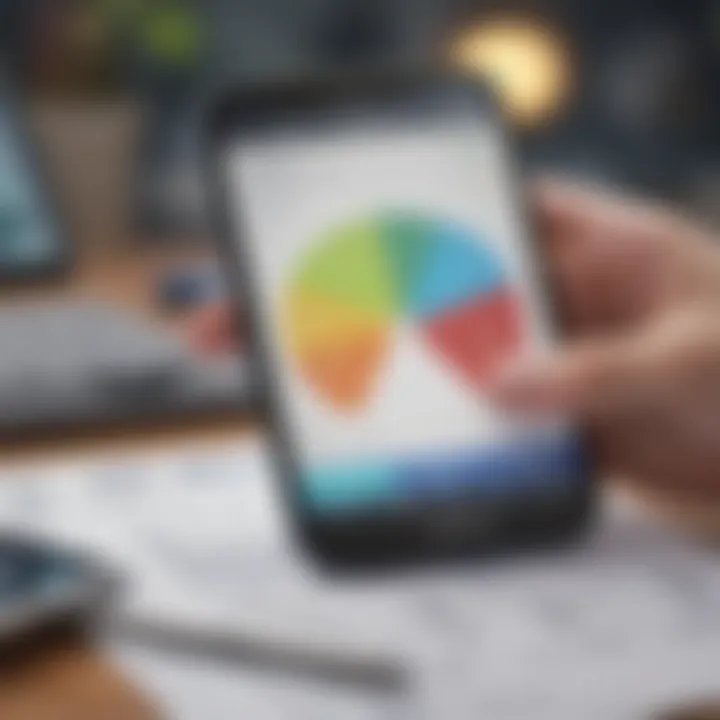In-Depth Review of Annual Budgeting Applications


Intro
In today's fast-paced world, keeping track of one's finances can feel like trying to chase a greased pig. The importance of managing money wisely has led many individuals to seek tools that can help simplify budgeting. Annual budget applications stand out as vital tools in navigating the labyrinth of personal finance. Their significance is not just about tallying incomes and expenses; these digital resources can facilitate informed decision-making and promote financial literacy.
Understanding how these apps function, what features they offer, and the criteria for choosing one is step one in leveraging their potential. In this examination, we'll explore these components in-depth, providing insights and guidance tailored to the needs of investors, financial advisors, and accountants alike.
Understanding the Concept of Budgeting
Budgeting is more than just a financial obligation; it is an integral lifeline for maintaining a stable economic footing. Understanding the concept of budgeting lays the foundation for effective personal finance management, especially for investors, financial advisors, and accountants who navigate today's complex financial waters. Budgeting, at its core, ensures that individuals or organizations can track income and expenses in a structured way, allowing them to plan for future financial needs, investments, and expenses.
When we talk about annual budgeting, it involves preparing a plan that outlines how to allocate resources over the course of a year. This intentional allocation of funds allows individuals and organizations to anticipate shortfalls, create savings, or make adjustments as necessary. What’s essential here is that budgeting can change lives, making it possible to steer clear of debt, allocate funds to investments, and sustain a lifestyle aligned with one’s goals and needs. In a nutshell, budgeting promotes financial awareness and discipline.
Defining Annual Budgeting
Annual budgeting is a systematic approach whereby individuals or organizations project their finances for the upcoming year. Typically, it starts with a clear assessment of current income, fixed expenses, variable expenses, and savings goals.
- Current Income: This is the sum of all sources of funds collected regularly, such as salaries, rental incomes, or investment returns.
- Fixed Expenses: These are costs that do not change over time, like mortgage payments or utilities. Dealing with these amounts is crucial since they can sink a budget if not accurately projected.
- Variable Expenses: Unlike fixed ones, these costs can fluctuate—for instance, groceries, dining out, and entertainment can vary each month.
- Savings Goals: Setting objectives for putting aside funds, be it for an emergency fund, retirement, or a specific project.
Crafting an annual budget typically entails categorizing these elements and engaging in thoughtful projection. This foresight allows for a clear understanding of where one stands financially and what adjustments may be necessary as the year unfolds.
Importance of Budgeting in Financial Planning
The significance of budgeting in financial planning cannot be overstated. It acts as a compass that guides decisions and mitigates the risk of financial miscalculations. Here are several reasons why understanding and implementing a budget is paramount:
- Enhances Clarity and Focus: Budgeting forces one to dive deeper into income and expenses, fostering a more profound understanding of spending habits. Awareness is the first step toward change.
- Supports Goal Achievement: Setting and following a budget serves as a pathway to achieving long-term financial goals, be it buying a home or affording a child's education.
- Promotes Financial Stability: With a clear budget, individuals can build an emergency fund, safeguarding them from unforeseen circumstances.
- Facilitates Better Decision Making: Having income and expenses laid out provides a clearer perspective and aids in evaluating the potential impact of financial decisions, thus making more educated choices.
"Budgeting is not just about restricting spending; it’s about freeing oneself to achieve financial independence and stability."
In essence, incorporating annual budgeting into one’s financial strategy aids in navigating the financial landscape with purpose and direction, making it an invaluable tool. Individuals and organizations alike who prioritize budgeting are better equipped to tackle their financial futures.
Overview of Budgeting Applications
In an age where sound financial decisions can make or break personal stability, budgeting applications have become indispensable tools for many. Their role goes beyond simply tallying numbers; they represent an essential interface between individuals and their financial realities. This section will lay the groundwork for understanding what budgeting apps are all about and how they can profoundly impact one's fiscal life.
Budgeting apps help individuals tailor financial plans to their unique circumstances, offering a level of personalization that standard spreadsheets or paper methods cannot match. In a world flooded with myriad financial choices, having a digital companion that is easy to use and efficient can be the difference between a thriving financial future and carrying the weight of debt.
What Are Budgeting Apps?
Budgeting apps are software applications designed to help users manage their finances effectively. Simple in nature, yet rich in functionality, these apps make it easier for individuals to track income, expenses, savings, and investments. They are usually available on mobile devices and desktops, providing accessibility and flexibility in financial management.
- Ease of Use: The user interfaces of most budgeting apps are intuitive. Users can often start tracking their finances with minimal setup.
- Automation: Many of these apps automate factors such as bill reminders and spending analytics, effectively minimizing the risk of missing payments.
- Accessibility: A plus for those constantly on-the-go; they sync across devices, ensuring you have your financial information at your fingertips.
Budgeting apps cater to a diverse range of financial situations—whether you are a student managing your limited funds or a retiree focused on maximizing your savings. They allow users to create budgets that adjust to fluctuations in income and expenses, demonstrating how easily they can adapt to varying financial contexts.
Types of Budgeting Apps Available
The world of budgeting applications is as varied as its users. Here's a rundown of the types available:
- Zero-Based Budgeting Apps: These apps encourage users to allocate every dollar to specific expenses, savings, or debt repayment. A popular example is You Need A Budget (YNAB).
- Percentage-Based Budgeting Apps: Here, the user divides expenses into categories and allocates a certain percentage of their income to each. Mint is a well-known name in this category.
- Expense Tracker Apps: Focusing narrowly on tracking spending, these apps provide a detailed view of where your money goes. Expensify serves this niche well.
- Investment-Focused Budgeting Apps: Some applications, like Personal Capital, merge budget management with investment tracking, offering a comprehensive financial overview.
- Savings Goal Apps: Designed for users who want to reach specific financial milestones, these apps help in setting targets and tracking progress toward those goals. A prominent example is Qapital.
Each type serves a unique purpose and offers different features that can appeal to distinct audiences based on their financial needs and goals. Understanding these categories can empower users to choose the right app that aligns with their lifestyle and aspirations.
Features to Look for in Budgeting Apps
Choosing the right budgeting app isn't just a matter of convenience; it's about finding a tool that truly aids in managing your financial life more effectively. Each app can offer various features, but understanding what to look for can be the difference between merely tracking your expenses and achieving meaningful financial progress.


A well-crafted budgeting app can serve as your financial guide, helping you organize your spending, save money, and meet financial goals. But as you sift through various options, keep in mind several core components that enhance the user experience and analytics.
User-Friendly Interface
First and foremost, a user-friendly interface is crucial. When dealing with finances, users often seek clear visuals and straightforward navigation. An app that confuses rather than assists can lead to frustration and errors.
- Intuitive Layout: The way information is presented should be logical. Users should instantly grasp where to find their data. Apps like Mint have a clean dashboard layout that makes it easy to see your net worth, budgets, and spending categories at a glance.
- Easy Navigation: A smooth, flowing experience ensures users stick with the app. There's no need to feel like you’re solving a rubik's cube when tracking your finances!
A solid user-friendly interface invites you to explore and engage rather than shy away from the complexities of budgeting.
Expense Tracking Capabilities
Next up, effective expense tracking capabilities can’t be overlooked. A budgeting app should allow users to log their expenses swiftly and categorize them for easy understanding. The richness of insight into spending habits is a game changer.
- Automated Tracking: Many apps import transactions directly from bank accounts and credit cards, saving time and minimizing manual errors. Apps like YNAB (You Need A Budget) use real-time updates that allow users to see their spending instantly.
- Category Customization: The ability to create and modify spending categories offers users flexibility. Perhaps you have a quirky passion for select hobbies or dining—being able to tailor categories makes the budgeting process more personalized.
Good expense tracking can shine a light on where funds disappear and where savings could be coaxed out.
Integration with Bank Accounts
In this digital age, integration with bank accounts cannot be merely an afterthought. The importance lies in seamless transaction tracking and financial health visibility.
- Real-Time Updates: Choosing an app that syncs with your bank accounts enables accurate and up-to-date reflections of your financial situation. This feature is particularly beneficial for budgeting on the go.
- Multiple Accounts: The ability to link multiple accounts allows for a holistic view of finances. For example, tracking both your checking and savings accounts in one place enhances transparency.
Integration helps in reducing the manual workload significantly, leading to a more streamlined financial review.
Data Security and Privacy
Last but certainly not least, data security and privacy should be top-notch. With sensitive financial information being stored, taking the right precautions is paramount.
- Strong Encryption: Opting for apps that offer high-level encryption safeguards your data from potential breaches. You want to rest easy, knowing your financial details are secure.
- Two-Factor Authentication: Apps that support two-factor authentication add an additional layer of security, requiring a second form of verification. This may seem like a hassle, but it’s a necessary step in today's risk-laden digital landscape.
Data security isn't just a feature; it’s a promise that your information will be safeguarded as you navigate your budgeting journey.
"The right budgeting app should feel like a security blanket, ensuring that while you focus on reaching your financial goals, your personal information remains protected."
Assessing Popular Annual Budgeting Apps
When diving into the world of budgeting apps, it's crucial to assess the popular options out there. These tools serve not only to organize one's finances, but also to motivate users toward accountability and wise spending choices. With a plethora of applications, understanding which ones stand out is essential. Popular budgeting apps provide unique benefits, such as simplified finance management and tailored solutions for individual needs. This section will navigate through app reviews and personal user experiences to help gauge their effectiveness and practicality.
App Reviews and Comparisons
Reviews play a paramount role in guiding users through the increasingly complex landscape of budgeting apps. Each application presents distinct features, pricing structures, and user interfaces that cater to various financial needs. Consider the following aspects when reviewing these apps:
- User Ratings: User feedback is often indicative of an app's reliability and functionality. A combination of positive ratings can highlight what a particular app does well. Meanwhile, consistent criticism might expose flaws that users find frustrating.
- Feature Assessments: Apps differ in functionality. Some offer comprehensive, integrated solutions, while others might excel at specific tasks like expense tracking or investment management. Familiarizing yourself with these distinctions can save you time and money.
- Price Comparison: While many apps offer free or freemium versions, the pricing for premium services can vary widely. Evaluating the cost against the unique features provided is essential. A higher price doesn't always equate to better service; thus, careful deliberation is requisite.
Here’s a brief rundown of some commonly reviewed apps:
- Mint – Highly available and user-friendly; perfect for novices.
- YNAB (You Need a Budget) – Focused on proactive budgeting, it encourages users to allocate every dollar efficiently.
- PocketGuard – Simplifies the budgeting process by showing how much disposable cash is available after accounting for bills and goals.
An in-depth examination of these options can guide users in choosing the best app suited for their financial habits.
User Experiences and Testimonials
User experiences offer invaluable insights that reviews alone may not cover. Hearing from real users can shed light on how an app performs in everyday life, impacting personal financial management positively or negatively.
Examples of common user sentiments include:


- Ease of Use: Many users appreciate the straightforward setup process. An intuitive design can make the detailed aspects of budgeting seem far less daunting.
- Support and Community: Users often lean toward apps that have robust support channels and communities. This can range from FAQs to active forums where advice is exchanged. For instance, users of YNAB often mention avoiding pitfalls through community support.
- Impact on Spending Habits: Numerous testimonials highlight a change in spending behavior after using these apps. Users report feeling more in control of their budgets and less likely to make impulsive purchases. One user shared, *"Initially, I thought it was just another app, but YNAB actually changed how I view my money. I spend with intention now."
"A budgeting app isn’t just a tool, it’s a partner in your financial journey."
Through these shared experiences and user testimonials, it’s possible to not only gauge the effectiveness of a budgeting app but also learn from others' successes and challenges.
Overall, assessing popular budgeting apps through reviews and user experiences helps paint a clearer picture of what works best. By weighing these insights carefully, users can significantly elevate their financial planning strategies.
Impact of Budgeting Apps on Financial Behavior
The influence of budgeting apps on financial behavior cannot be overstated. These applications provide users with a structured way to analyze their spending habits, set targets, and make informed financial decisions. They have revolutionized personal finance management, offering tools that can reshape long-standing behaviors surrounding money. By fostering accountability and providing real-time insights, budgeting apps play a crucial role in the financial landscape for individuals and households alike.
Behavioral Changes Induced by App Utilization
When individuals engage with budgeting apps, several notable behavioral shifts often emerge. First and foremost, users typically develop a heightened awareness of their spending patterns. The act of recording expenses in these applications often sparks a realization of where money is truly going. For many, this is an eye-opener only previously seen in abstract terms. Even simple notifications about spending can lead to reconsidered purchases, promoting a more cautious approach to one's finances.
Moreover, the sense of accountability that these apps instill can lead to more disciplined spending habits. Budgeting apps often enable users to set specific goals—be it saving for a vacation or paying down debt. When individuals see their progress tracked in real-time, they tend to be more motivated to stick to their plans. This means that, in a way, the apps serve as both a guide and a virtual cheerleader, celebrating victories, no matter how small.
To illustrate this, consider a user named Laura, who previously dabbled in impulsive purchasing. After utilizing a popular budgeting app, she began categorizing her expenses. Over time, Laura found herself reconsidering her daily latte purchases, which once were a treat she indulged in without thought. Now, she treats it as a conscious decision.
In essence, the behavioral transformation often stretches beyond just spending habits; it can enhance a user's overall financial literacy. With the inclusion of educational resources alongside budgeting tools, apps can position users to make better financial choices moving forward.
Long-Term Financial Benefits
The long-term benefits of integrating budgeting apps into everyday financial management extend well beyond immediate fiscal discipline. One of the most significant advantages is the potential for improved savings over time. By consistently tracking expenditures and sticking to budgets, individuals can gradually increase their savings rates. This not only provides a cushion for unforeseen expenses but also empowers users to engage in more significant financial opportunities like investments.
Research indicates that individuals who actively use budgeting apps tend to experience a shift from living paycheck to paycheck towards a more comfortable financial buffer. Some common long-term benefits include:
- Debt reduction: Through focused budgeting and expense tracking, users can identify unnecessary expenses, which can be redirected toward paying down debts.
- Higher savings: By establishing monthly savings goals, users often find it easier to put money aside for short-term and long-term needs.
- Improved investment readiness: With a stable financial picture, individuals are better equipped to consider investments that may align with their future goals.
- Enhanced financial confidence: This can lead to increased willingness to explore financial planning strategies, retirement accounts, or other wealth-building tools.
"The journey of financial improvement often begins with simply knowing where your money goes. Budgeting apps make that first step accessible and manageable."
Simply put, integrating a budgeting app into one’s financial routine can serve as an excellent investment in one's future financial well-being. The behaviors and habits cultivated through these tools lay the groundwork for a more secure and financially healthy path.
Challenges and Limitations of Budgeting Apps
In the realm of personal finance, budgeting apps present as powerful tools for tracking expenditures, setting financial goals, and gaining insights into spending habits. However, beneath the shiny interfaces and promising features lies a myriad of challenges that users must navigate. Understanding these hurdles is crucial for anyone considering the integration of these applications into their financial management strategies. Not everything is rosy with budget apps; their limitations can significantly influence a user’s financial journey.
Technical Issues and Platform Stability
Technical glitches can throw a real wrench in the works when using budgeting apps. Users often find themselves facing issues ranging from software bugs to network connectivity problems. For instance, if an app fails to sync properly with bank accounts, it can lead to inaccurate tracking of expenses, causing confusion and potential overspending.
Moreover, some budgeting platforms are prone to crashes or delays during peak usage times, such as the end of the month, when most users are likely reviewing their finances. Such instability can deter users from trusting the app for their critical budgeting tasks. For individuals dependent on real-time tracking, any lag can result in missed opportunities to curb unnecessary spending or redirect funds toward savings or investments.
Consider the case of Mint, a popular budgeting app that, despite its extensive capabilities, has had its share of performance hiccups. Users frequently report difficulties in connecting bank accounts, which leads to inconsistent data and frustration over the app's reliability.
Privacy Concerns and Misuse of Data
Another significant concern that lurks behind the use of budgeting apps is privacy. In an age where data breaches are becoming the norm, the handling of sensitive financial information must be approached with utmost caution. Many budgeting apps require users to input sensitive financial details, including bank account numbers and spending habits. This collection of data raises eyebrows, and rightfully so.
"Data privacy isn't just about safeguarding personal information; it's about ensuring users have control over their own financial narratives."
Many users are often unaware of how their data is being utilized. Some apps harvest information not just for operational purposes but also for targeted advertising or even selling to third parties. For example, amidst the convenience of features like financial forecasts or personalized ads, users might inadvertently be giving away valuable insights into their financial behaviors.
Consequently, it’s vital for users to thoroughly investigate the privacy policies of the apps they choose. Familiarizing oneself with terms of service can illuminate potential pitfalls and help safeguard against unwarranted data misuse.


Addressing these challenges isn’t about shying away from budgeting apps but rather about approaching them with a critical eye. Understanding the technical issues and data privacy risks can help users navigate the budgeting app landscape more effectively, ensuring that they harness these tools to their full potential while remaining vigilant about their financial security.
Best Practices for Using Budgeting Apps
When diving into the world of annual budgeting apps, it’s crucial to understand the best practices that can not only enhance your experience but also ensure that you make the most out of these powerful tools. The right approach can transform a simple budgeting exercise into a pathway for financial clarity and control. By adhering to these practices, users will not only refine their budgeting capabilities but also develop a more profound understanding of their financial landscape.
Setting Realistic Financial Goals
Establishing achievable financial goals forms the bedrock of effective budgeting. It's tempting to aim for the stars, thinking big is the way to go; however, inflation in expectations can lead to disillusionment and frustration. Instead, a more sensible approach is to set S.M.A.R.T. goals—Specific, Measurable, Achievable, Relevant, and Time-bound. This could mean planning to save a certain amount each month, paying off a specific debt, or even building an emergency fund. For instance, instead of saying, "I want to save money," you might say, "I will save $200 every month for the next six months."
"Goals are dreams with deadlines."
—Harvey Mackay
Benefits of realistic goals stretch beyond mere numbers; they provide motivation and a clear path forward. When users hit these milestones, however minor, it reinforces behaviors conducive to saving and responsible spending. Additionally, regularly tracking your progress within the budgeting app can help maintain focus and adjust expectations as necessary. Every penny saved brings you closer to financial freedom.
Regularly Reviewing and Adjusting Budget Plans
The financial world is perpetually in flux; expenses rise and fall, incomes shift, and personal priorities change. Hence, making it a habit to review your budget regularly is not just suggested but essential. This involves taking a critical look at your spending habits, evaluating variances, and adjusting your allocations accordingly. A budgeting app typically offers visual graphs or reports that can help pinpoint where the budget is going off track.
Around the end of each month, set aside some time to reflect on your expenditures. Ask yourself questions like:
- Did I stick to my planned budget?
- Where did I overspend?
- What accounts for any unexpected expenses?
- Do I need to shift funds to accommodate upcoming needs?
Such reflective practice doesn’t just spot issues—it's an occasion to celebrate successes too. Aspects of budgeting that worked well should be reinforced. This mindful process helps in fine-tuning your financial strategy, keeping you ahead of the curve. Moreover, the flexibility to reallocate funds to match priorities ensures that budgeting is a dynamic activity rather than a static one.
By implementing these practices in your use of budgeting apps, you stand to benefit from a structured yet adaptable approach to personal finance. This leads to enhanced financial literacy, conscious spending, and better overall financial health.
Future Trends in Budgeting Apps
In today’s fast-moving financial landscape, understanding future trends in budgeting apps has become crucial for both users and developers. As technology continues to evolve, so do the needs and preferences of users. The importance of focusing on these trends lies in creating solutions that not only meet current demands but also anticipate future requirements. Companies that grasp these shifts will be better positioned to capture market share and foster customer loyalty.
Emerging Technologies in Financial Management
As we look ahead, several technologies are stirring the pot in the realm of budgeting apps. For instance, artificial intelligence is stepping into the limelight. AI-driven features—such as personalized spending recommendations and predictive analytics—are enhancing the user's experience. Imagine an app that analyzes your spending habits and predicts your budget needs for the upcoming months. This kind of foresight can empower users to make informed financial decisions.
Moreover, blockchain technology also casts its shadow on the budgeting landscape. With its focus on security and transparency, blockchain can offer an added layer of confidence in transaction recording. For example, when users link their bank accounts or credit cards to a budgeting app, the traceable nature of blockchain can protect their data from potential breaches. While still a budding concept, it holds promise for enhancing trust in financial management tools.
Lastly, voice recognition technology is making waves. Picture this: you're driving home from work, and instead of stopping to enter expenses manually, you simply voice your transactions. Apps that incorporate such features will definitely resonate with users who favor convenience and speed in their budgeting tasks.
Prediction of User Needs and Preferences
To predict user needs and preferences moving forward, it's essential to stay attuned to the buzzing conversations happening in various communities. Social media platforms such as Facebook and discussions on Reddit often reveal what users feel is missing from existing apps. Engaging with these platforms can offer invaluable insights. For example, many users express a desire for more gamified elements in budgeting apps—features that allow them to earn rewards for meeting financial goals could be a big draw.
Additionally, user interface will continue to shape preferences. Many users, particularly younger demographics, prefer a clean and visually appealing design over cluttered interfaces. As the competition grows fiercer, the importance of aesthetics combined with functionality cannot be overstated.
"A successful budgeting app is not just about tracking numbers; it’s about creating an engaging experience that resonates with users on a personal level." - Financial Expert
In summation, the future of budgeting apps is poised to be significantly influenced by technology and user feedback. Staying one step ahead in understanding these trends will not only enhance user satisfaction but will also lay the groundwork for innovation in financial management.
Culmination
Final thoughts on annual budgeting applications are crucial for anyone venturing into personal finance management today. These tools not only streamline the budgeting process but also empower users to take charge of their financial future. Not every app suits every user, so it’s essential to carefully consider what each offers in terms of functionality and accessibility.
Recap of Key Takeaways
- Understanding Budgeting Apps: Users should grasp the various types of budgeting apps available, from basic trackers to those integrating advanced features like real-time syncing with bank accounts.
- Features Matter: It's essential to select an app that prioritizes user experience, expense tracking, and data security. A lack of these features could derail a user’s budgeting efforts.
- Real-World Impact: Utilizing budgeting apps can lead to significant behavioral changes over time, showing users the direct correlation between using these apps and improved financial health.
- Challenges to Consider: Understanding the potential technical issues and privacy concerns can prepare users to face possible roadblocks.
- Trends Ahead: It's also worth noting how emerging technologies could reshape budgeting applications, making them even more tailored to user preferences and needs in the future.
Final Recommendations for Users
- Prioritize user-friendly interfaces. Engaging with your budgeting app should feel intuitive. Spend time testing different applications until you find one that resonates with you.
- Set and adjust realistic financial goals within the app. Goals that feel achievable can make a big difference in long-term engagement and success.
- Regularly review your finances through the app. A monthly review can unveil patterns you might not notice daily, lending itself to smarter financial decisions.
- Consider the security features of your chosen app. Research how they handle data encryption and privacy to keep your information safe.
- Finally, stay open to changes. As user needs evolve, so do apps—be prepared to adapt your approach to budgeting as new technologies emerge.
"An informed choice in budgeting enhances financial literacy, empowering users to make decisions that align with their long-term aspirations."
By thoughtfully reflecting on these elements, users can truly harness the power of budgeting apps to their benefit, aligning their financial behaviors with their life goals.







